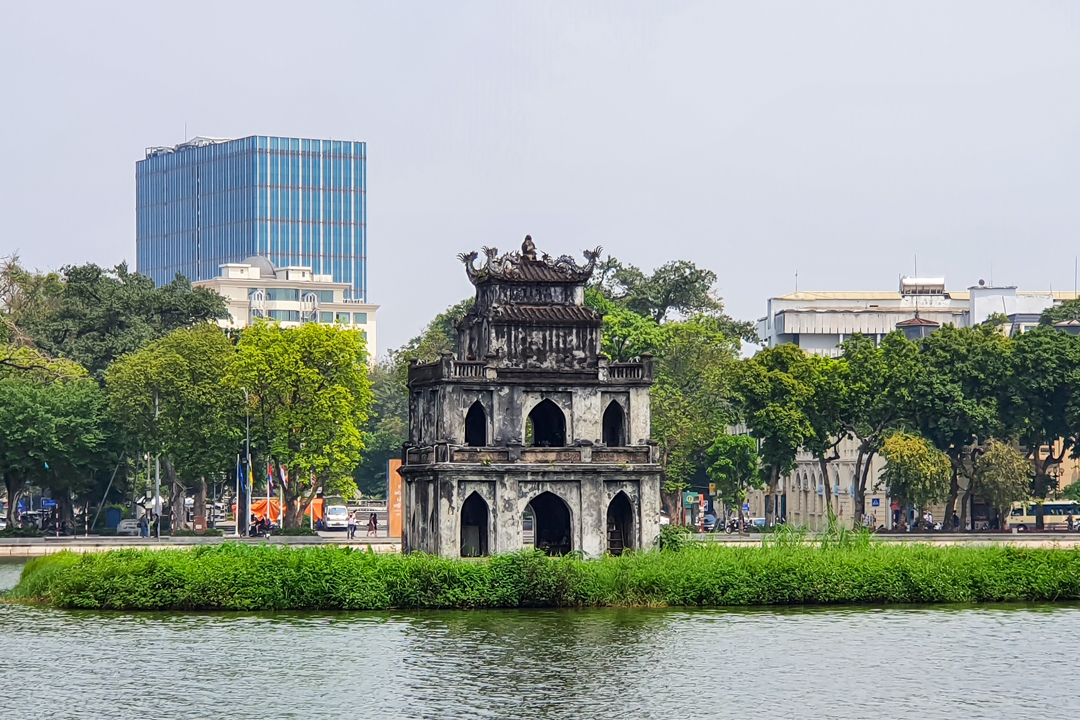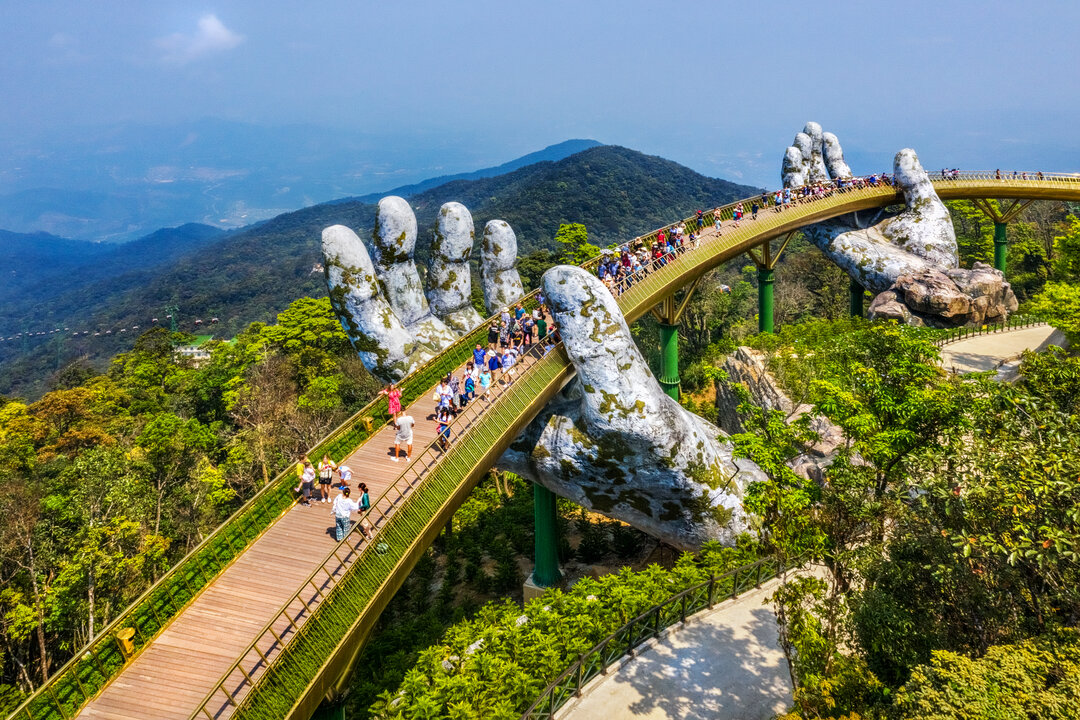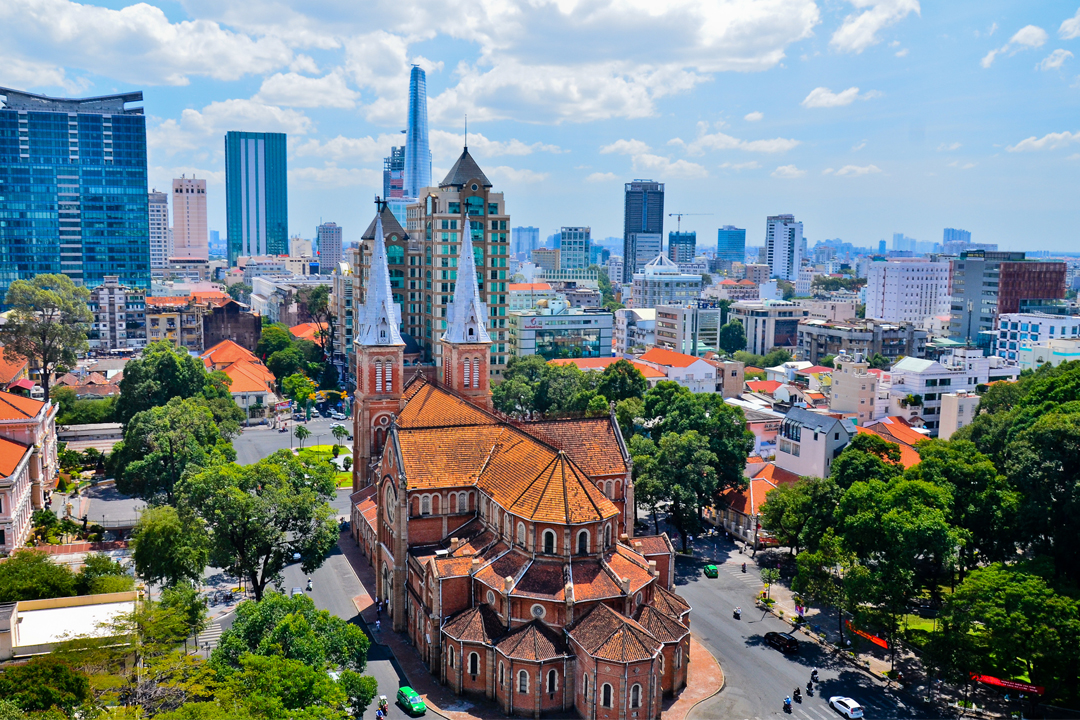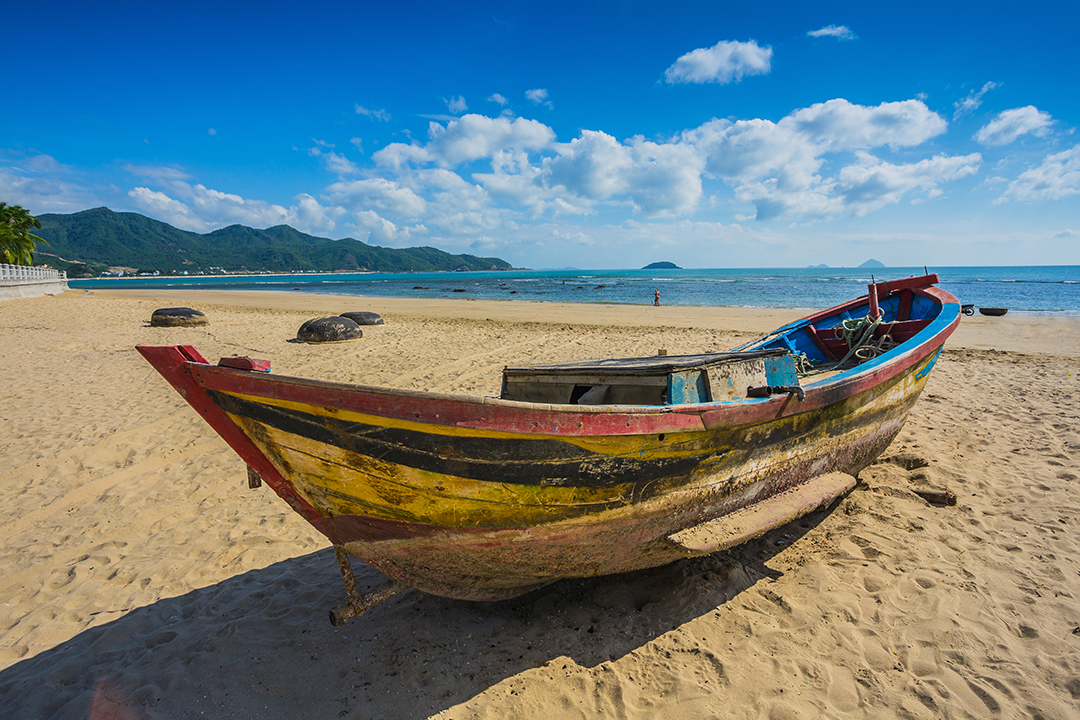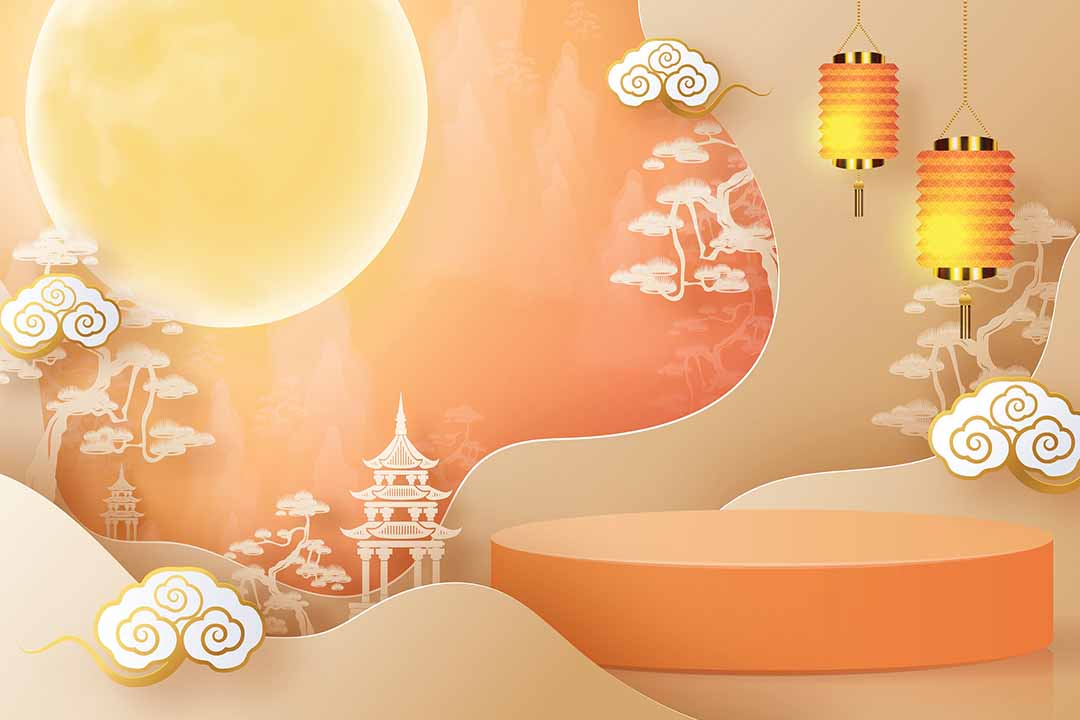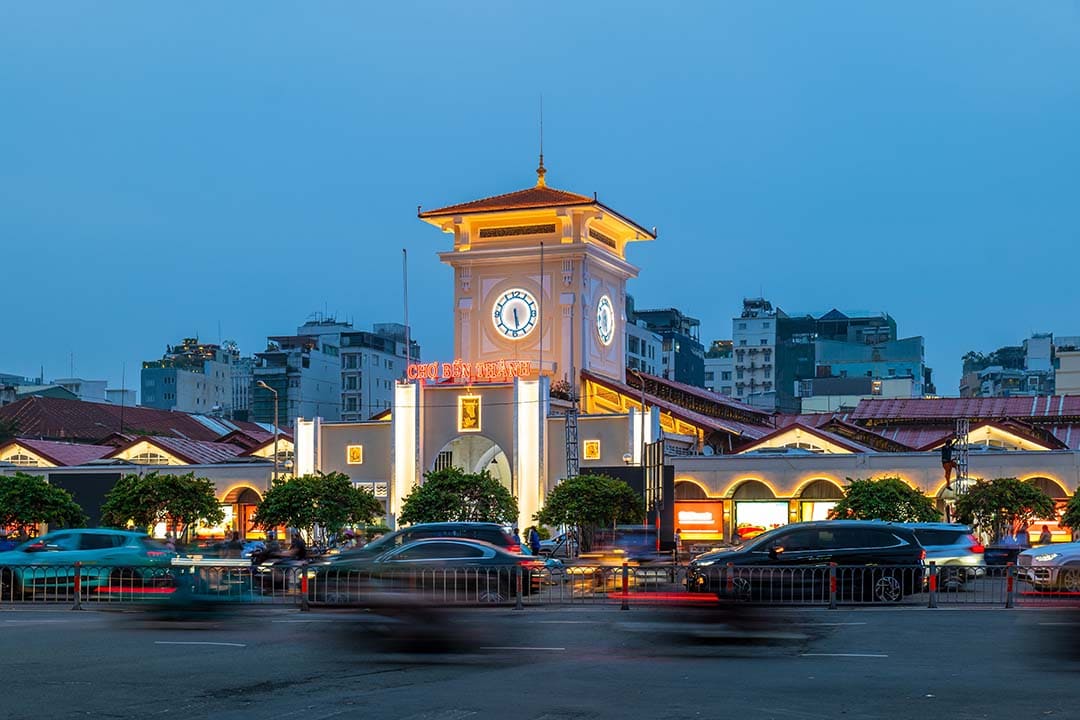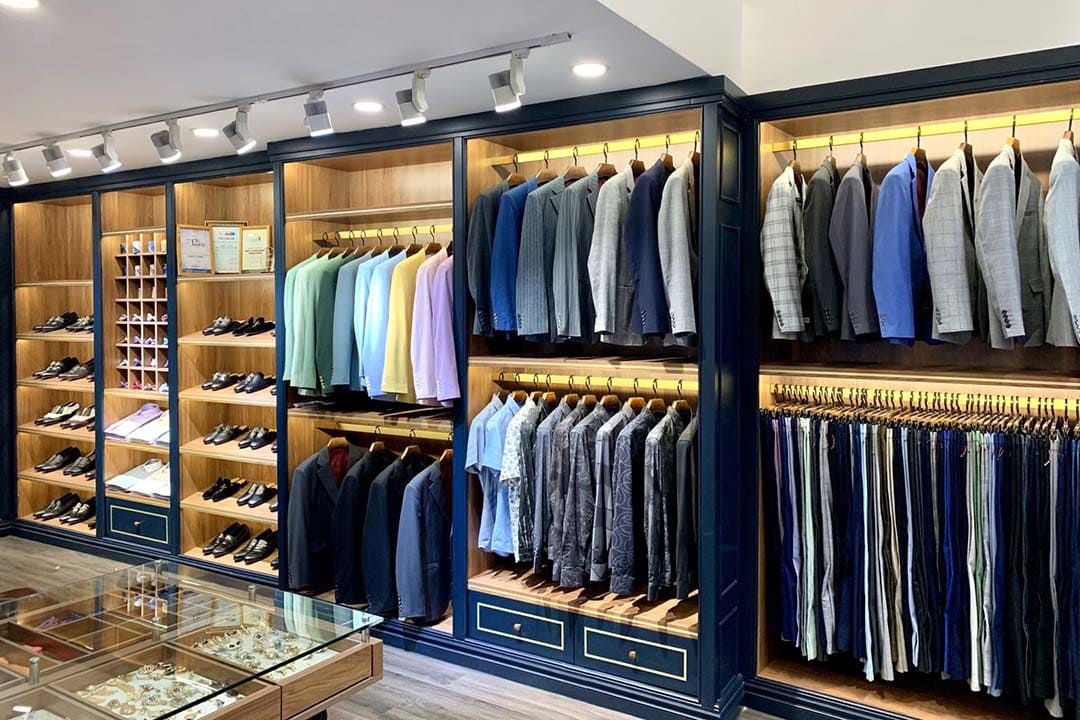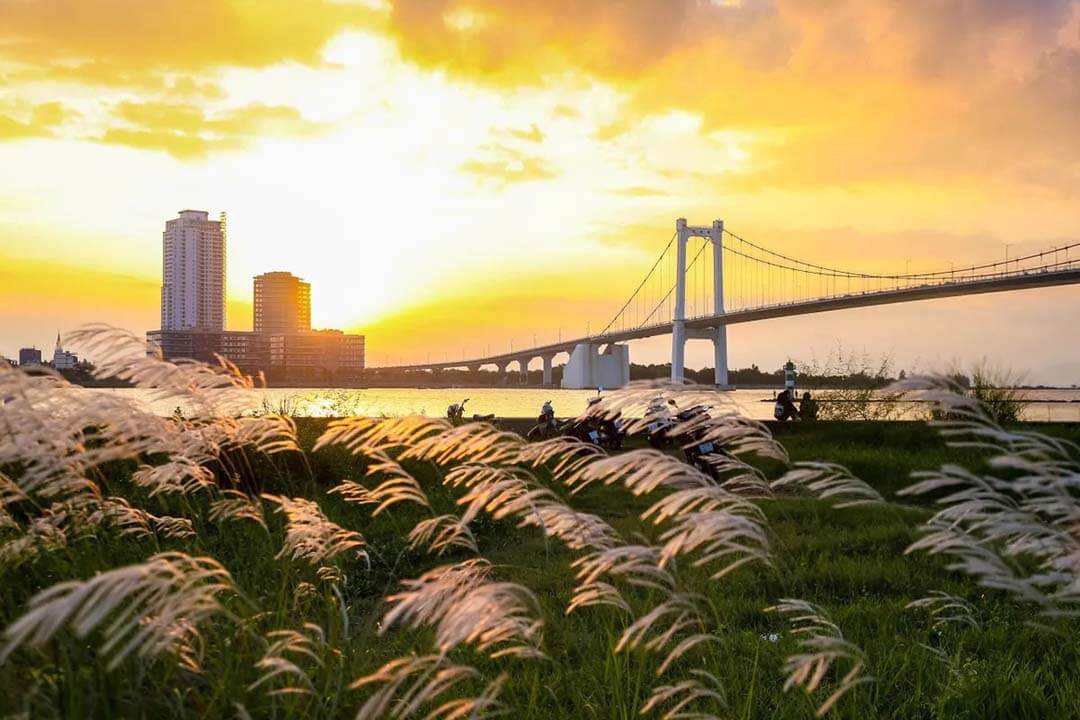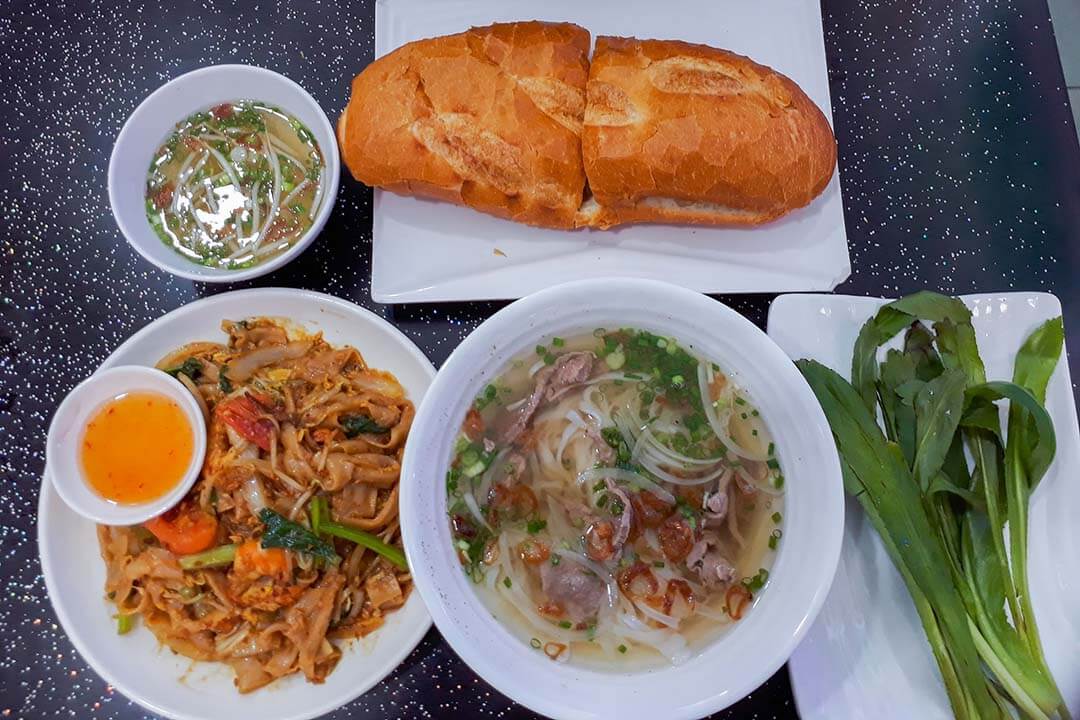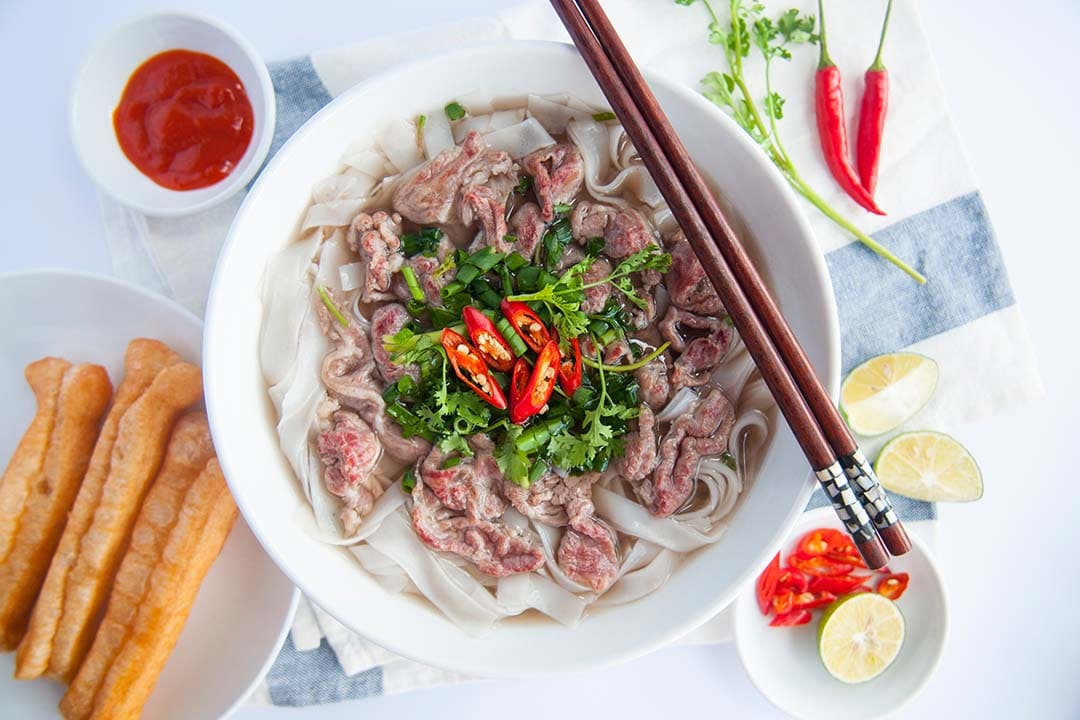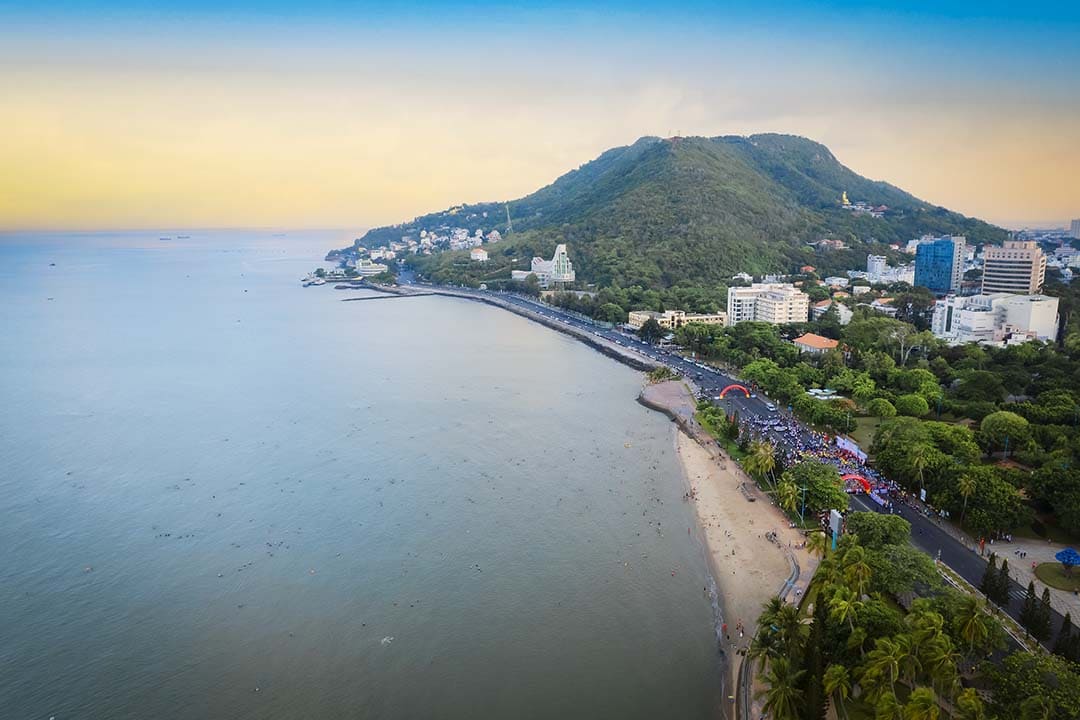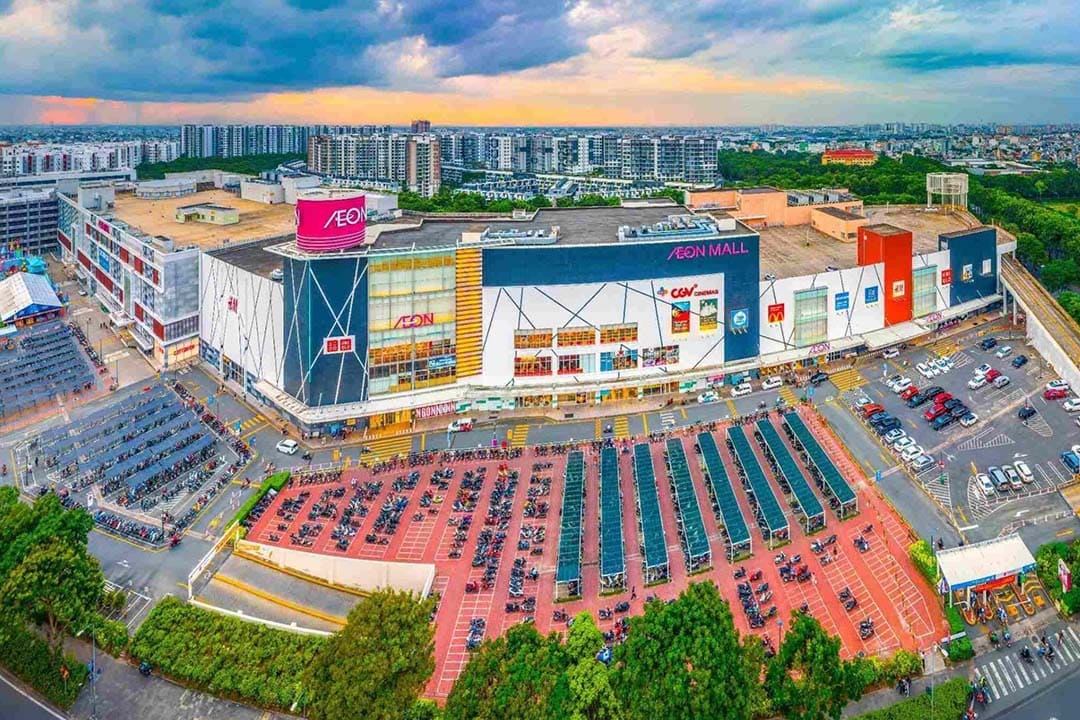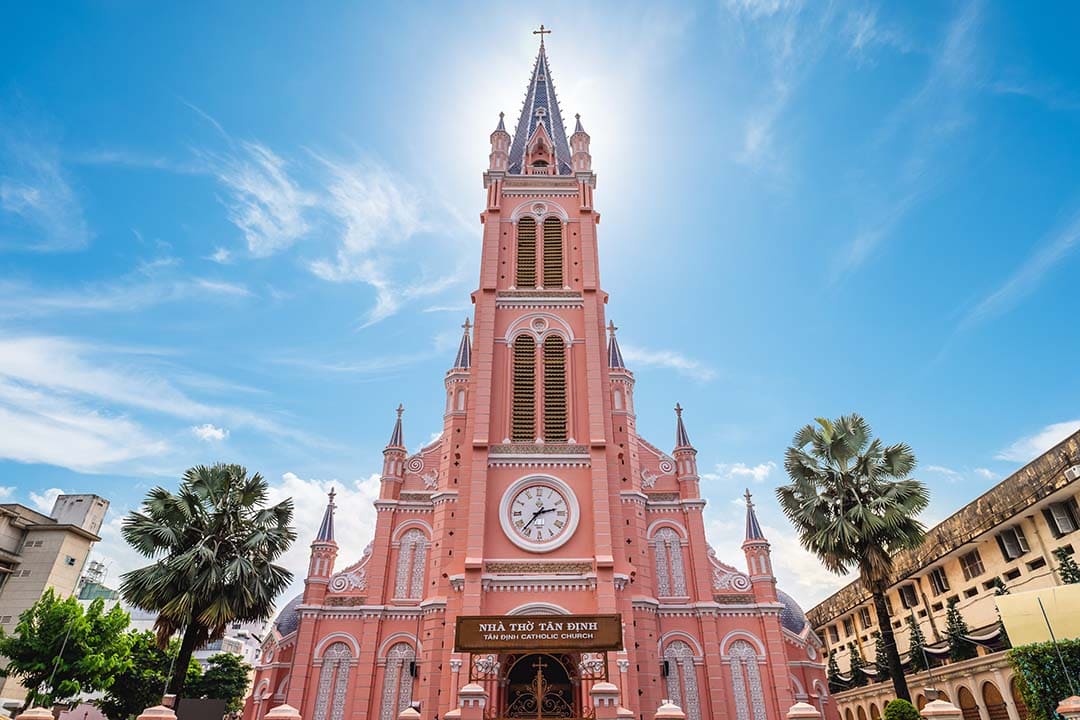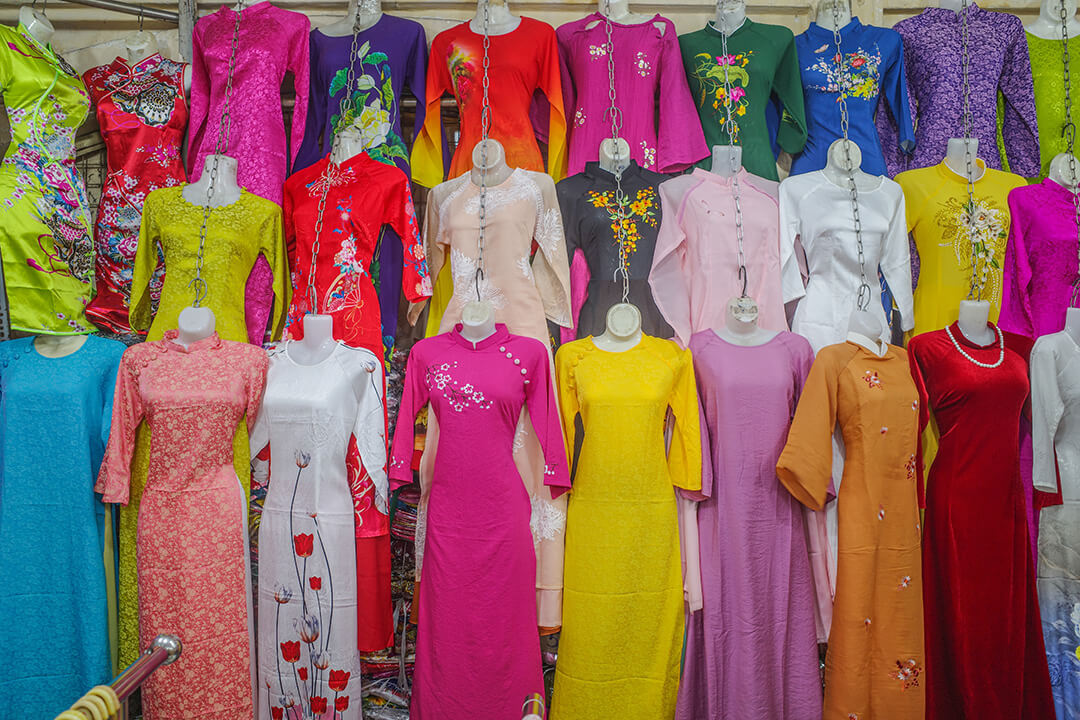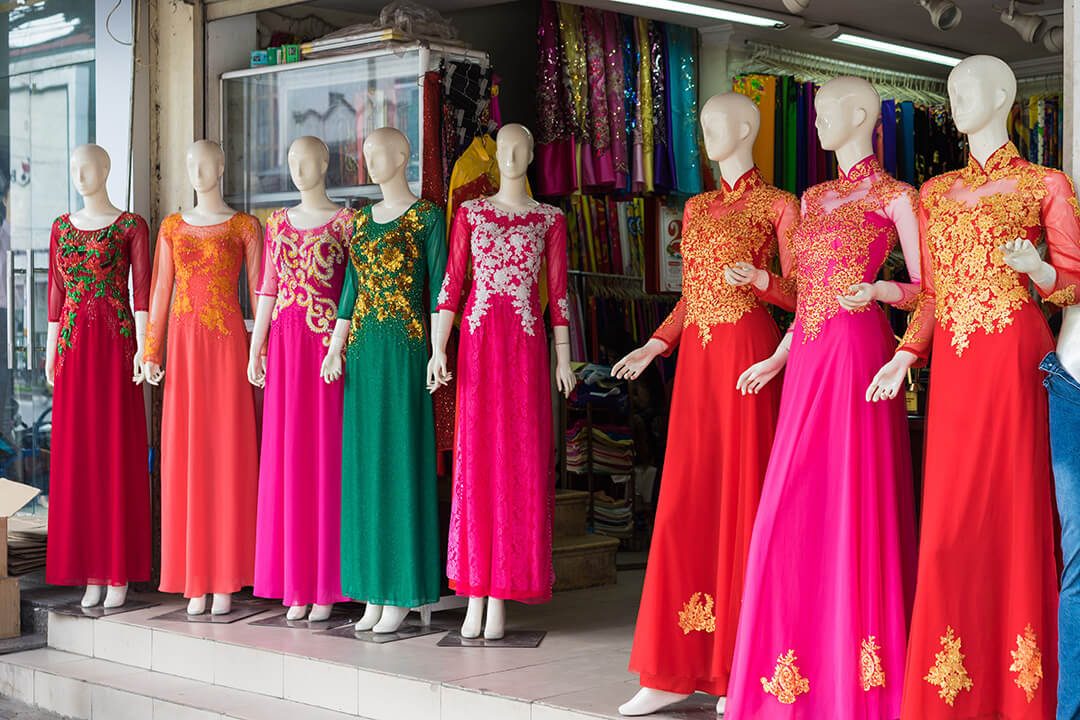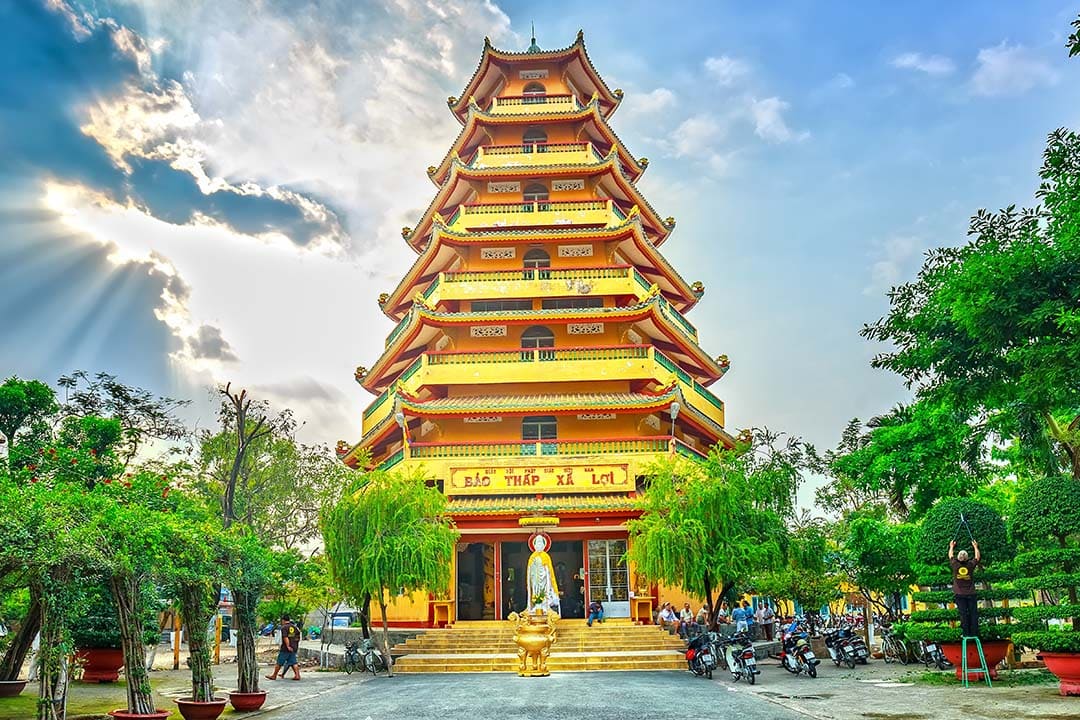Oct - 01 - 2025
Festivals in Hanoi are more than mere celebrations. They are vibrant gateways into the heart of Vietnamese culture, offering a mesmerizing blend of tradition, color, and community spirit. For travelers seeking an authentic experience, understanding these festivals is key to unraveling the city's rich cultural tapestry. This article by GTrip will guide you through the essential events that make Hanoi a cultural jewel waiting to be explored.
1. Perfume Pagoda Festival - A major spiritual pilgrimage near the city
- Location: Perfume Pagoda, My Duc Commune (formerly Huong Son Commune, My Duc District), Hanoi
- Dates: 6th day of January - March (Lunar calendar)
The Perfume Pagoda Festival (Hoi Chua Huong) is one of northern Vietnam’s most important Buddhist events, attracting hundreds of thousands of pilgrims to the sacred complex located on the bank of the Day River, about 55km from downtown Hanoi. Opening on the 6th day of the first lunar month and lasting until the end of March, it is a spiritual journey rather than just a destination. Pilgrims begin with an offering at Den Trinh, then either take a cable car or hike the scenic mountain path with shrines along the way, before reaching Huong Tich Cave - the festival’s heart. Here, worshippers pray to Quan Am (Goddess of Mercy) for happiness, prosperity, and fertility, touching sacred stalactites believed to bring blessings.
Alongside solemn rituals, the festival also offers a lively cultural atmosphere with folk music, vegetarian food stalls, handicrafts, and traditional games. It blends devotion and celebration, creating an authentic glimpse into Vietnamese spirituality. For visitors, the best time to experience the festival while avoiding extreme crowds is weekdays in late February to early March, when the weather is pleasantly cool (15-25°C).
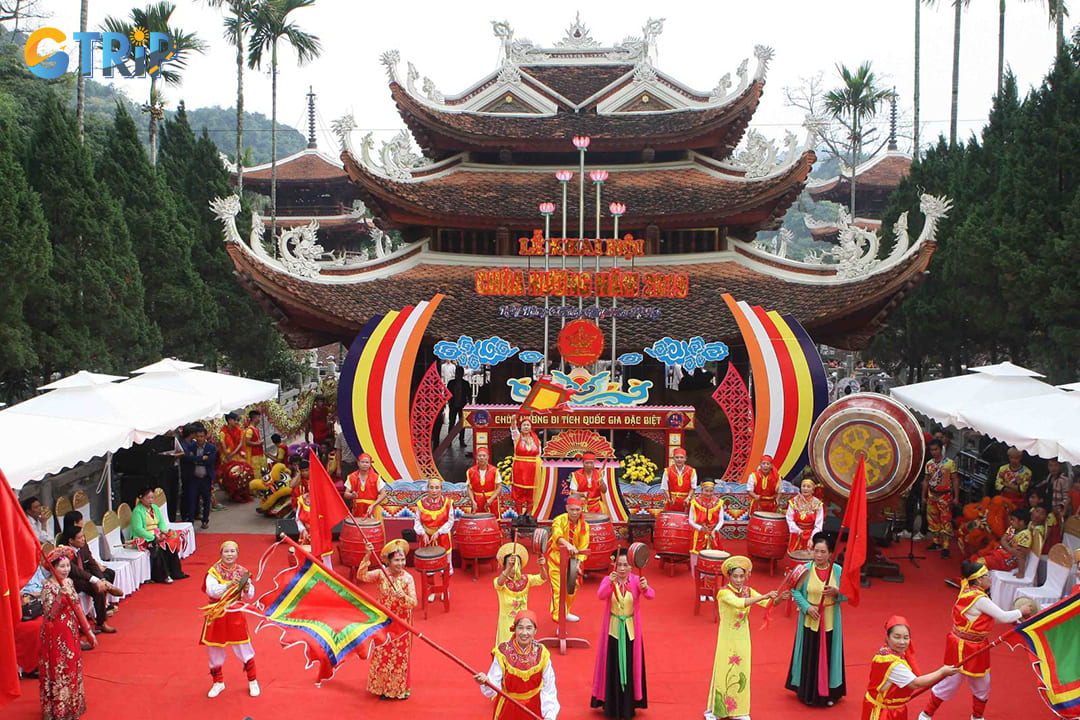
The Perfume Pagoda Festival, one of northern Vietnam’s largest spiritual events, welcomes thousands of pilgrims
2. Dong Da Festival - One of Hanoi's oldest cultural festivals
- Location: Dong Da Mound, Dong Da Ward (formerly Dong Da District), Hanoi
- Date: 5th day of January (Lunar calendar)
The Dong Da Festival is one of Hanoi’s most meaningful historical events, honoring King Quang Trung’s victory over the Qing army in 1789. Held at Dong Da Mound, the former battlefield, it represents both national pride and gratitude to those who sacrificed for Vietnam’s independence. Joining the festival is not just attending a celebration but reliving a decisive moment in the country’s history.
The day begins with an incense ceremony at King Quang Trung’s temple, followed by vibrant activities that recreate the atmosphere of the legendary Spring Victory. Highlights include historical battle reenactments, martial arts and drum performances, folk singing, and flag processions symbolizing triumph. Visitors can also taste traditional dishes like banh chung and experience a deeply patriotic spirit that unites the community. Arriving early ensures a chance to witness the main ceremonies in their most authentic form.
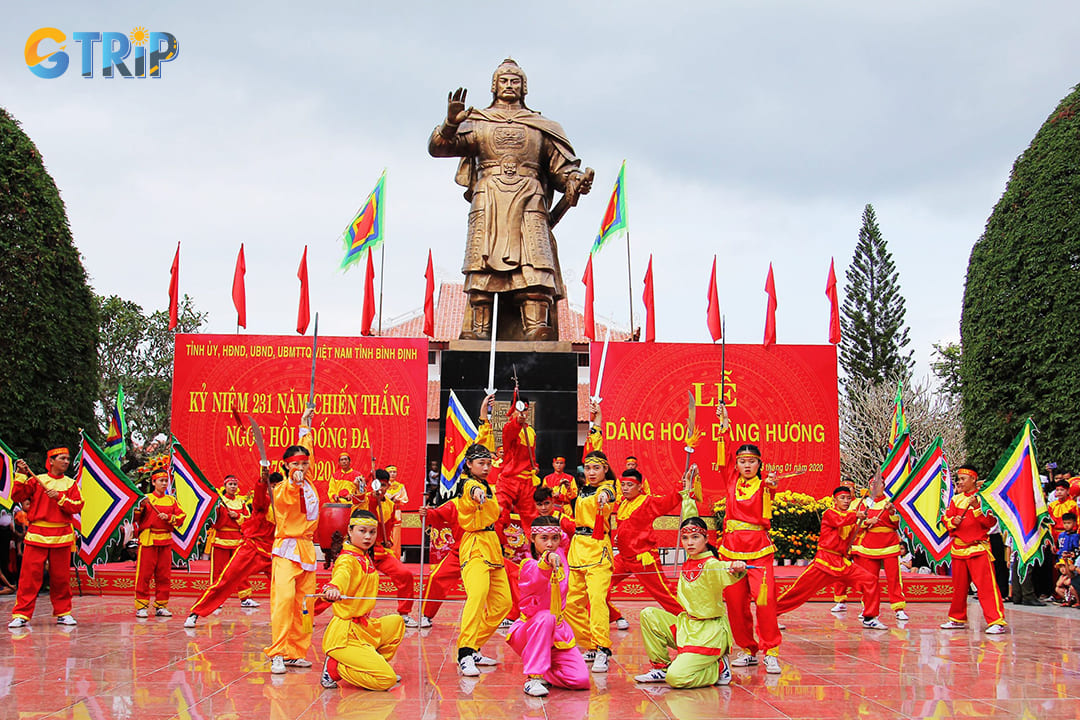
The Dong Da Festival in Hanoi honors King Quang Trung’s 1789 victory over the Qing dynasty with patriotic pride and cultural traditions at historic Dong Da Mound
3. Kim Ngan Communal House Festival - Procession of gold and silver around Hanoi Old Quarter
- Location: Hang Bac Street, Hoan Kiem Ward (formerly Hoan Kiem District), Hanoi
- Date: 4:00 PM - 5:30 PM on April 22
The Kim Ngan Communal House Festival is a celebration of Hanoi’s centuries-old silversmithing tradition, held annually on Hang Bac Street in the Old Quarter. Dating back to the 15th century, Kim Ngan Communal House once served as both a guild headquarters and a spiritual center for artisans, who gathered here to honor their craft ancestors. During the festival, locals and artisans pay tribute to the patron deity of silversmiths, offer prayers for prosperity, and showcase exquisite craftsmanship that reflects the deep connection between Hanoi’s spiritual life and its craft heritage.
The highlight is the spectacular silver procession at 4:00 PM, lasting about 90 minutes. It features ceremonial offerings, artisans presenting gold and silver works, traditional music, and lively dragon dances that light up the narrow streets. Visitors can best enjoy the event by arriving early to secure a spot along Hang Bac or Ma May Street. After the parade, the restored Kim Ngan Communal House offers a museum-like experience, with displays of tools and silver artifacts that preserve the legacy of Hanoi’s master craftsmen.
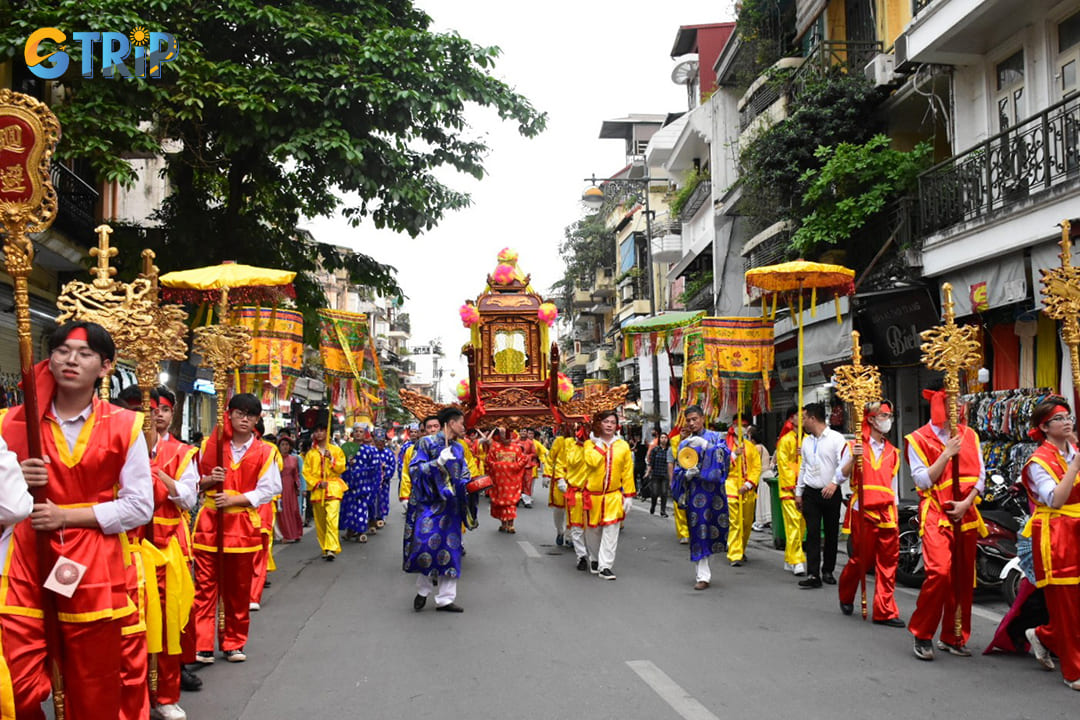
The Kim Ngan Communal House Festival on Hang Bac Street celebrates Hanoi’s centuries-old silversmithing heritage with rituals, artistry, and cultural pride
4. Bat Trang Pottery Festival - Honors Hanoi's renowned craft village
- Location: Bat Trang Pottery Village, Gia Lam Commune (formerly Bat Trang Commune, Gia Lam District), Hanoi
- Dates: 14th-16th days of the second lunar month (usually March-April)
The Bat Trang Pottery Festival is a three-day tribute to Vietnam’s oldest and most renowned ceramic village, located just 13km southeast of Hanoi. With roots in the Ly Dynasty over 700 years ago, Bat Trang developed thanks to its rich white clay and riverside trade routes. The festival honors founding potters through rituals at the communal house, where artisans express gratitude for ancestral knowledge and seek blessings for prosperity. It not only preserves craft heritage but also connects today’s community with the cultural and spiritual foundations of Vietnamese artistry.
Beyond ceremonies, the festival is alive with activities that let visitors experience the craft firsthand. Highlights include live pottery demonstrations, traditional kiln-firing at night, folk performances, and exhibitions of historic and modern pieces. Travelers can join workshops to shape clay or paint their own ceramic souvenirs, visit multi-generational family studios, and enjoy local cuisine served in handmade pottery. Together, these experiences transform the event into an authentic immersion into the legacy and living spirit of Bat Trang’s craftsmanship.
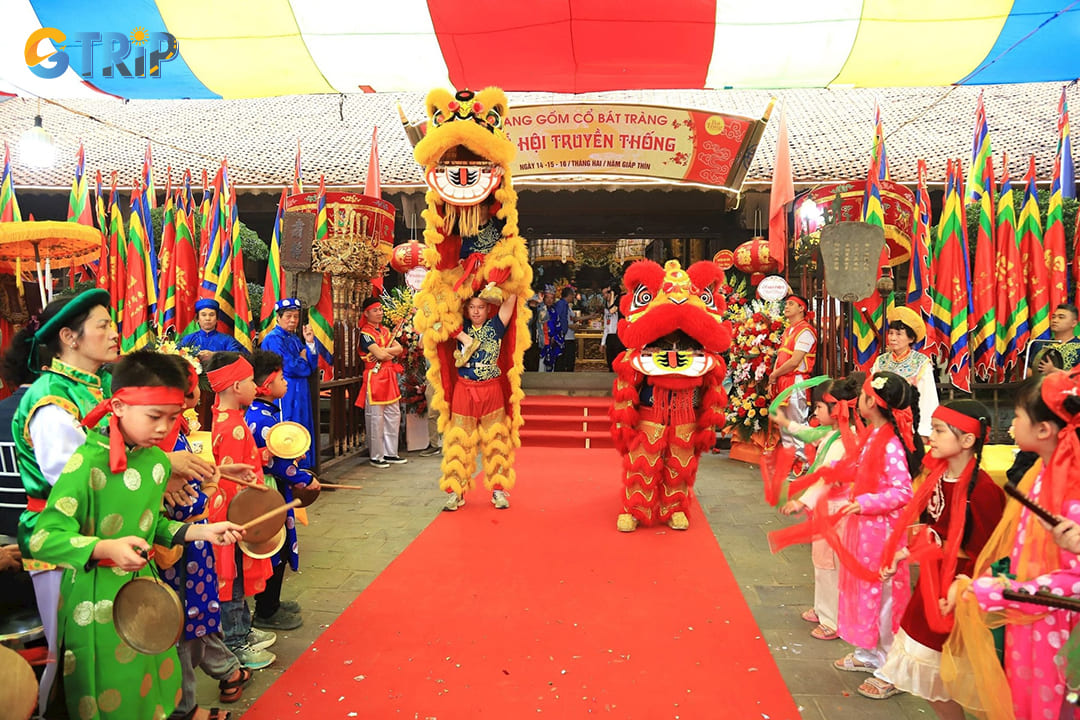
The Bat Trang Pottery Festival near Hanoi celebrates over 700 years of ceramic heritage with ancestral rituals, artisan showcases, and vibrant cultural traditions
5. Hai Ba Trung Festival - Commemorates Vietnam's National Heroines
- Location: Ha Loi Village, Me Linh Commune (formerly Me Linh District), Hanoi
- Date: 6th day of January (Lunar calendar)
The Hai Ba Trung Festival is one of Vietnam’s most meaningful commemorations, honoring the Trung Sisters who led the first uprising against Chinese domination in 40 AD. Taking place in Ha Loi Village, Me Linh Commune, the festival celebrates their courage and enduring legacy as symbols of national independence and female leadership. The rituals begin with incense offerings at the temple, followed by solemn processions and a unique water ceremony symbolizing purification. The main worship service pays tribute to the sisters’ spirits, while folk songs, dances, and performances vividly retell their heroic story for younger generations.
Beyond its spiritual significance, the festival also creates a vibrant cultural scene that brings ancient Vietnam to life. Visitors can enjoy traditional games like wrestling, bamboo swinging, and cockfighting, browse handicraft exhibitions, or savor regional dishes at local food stalls. Historical reenactments and cultural displays add educational value, connecting modern audiences with the spirit of resilience and sacrifice. For both locals and travelers, it is an inspiring experience that blends history, culture, and national pride.
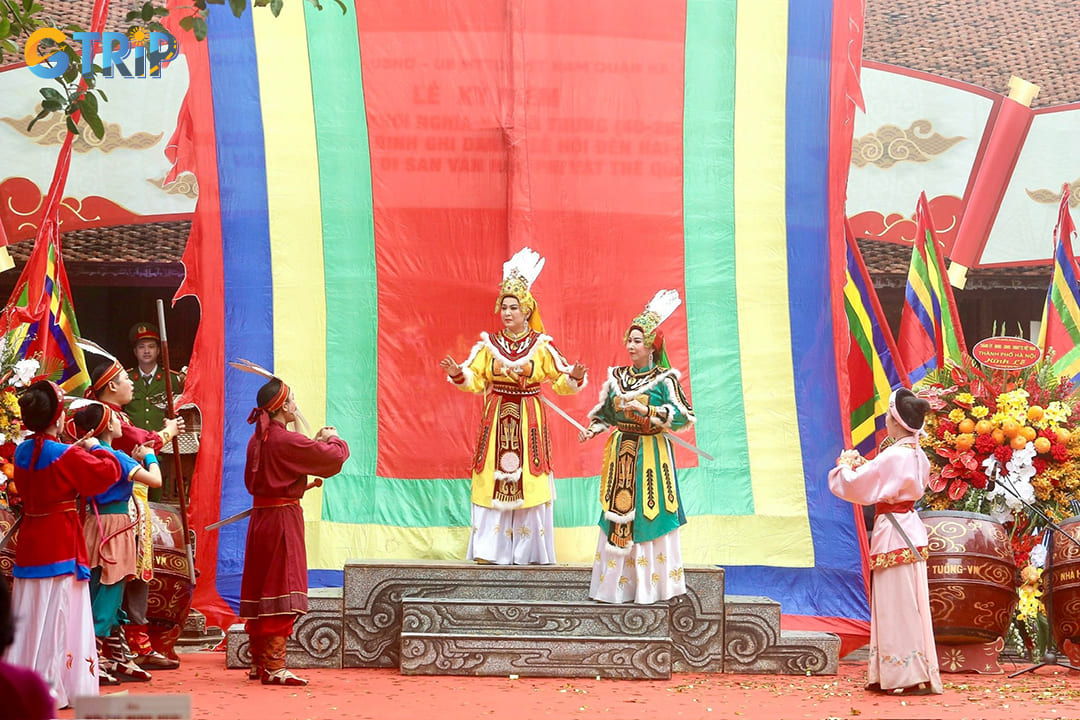
The Hai Ba Trung Festival in Ha Loi Village commemorates the Trung Sisters’ 40 AD uprising, honoring female leadership and patriotism each Lunar January 6
6. Giong Festival - A famous traditional event in Hanoi
- Location: Soc Son Temple, Ve Linh Mountain, Soc Son Commune (formerly Phu Linh Commune, Soc Son District), Hanoi
- Dates: 6th - 8th days of January (Lunar calendar)
The Giong Festival is one of Vietnam’s most significant traditional celebrations, honored as UNESCO Intangible Cultural Heritage since 2010. Taking place from the 6th to 8th day of the first lunar month at Soc Son Temple on Ve Linh Mountain, it commemorates the legendary Saint Giong, who miraculously grew into a giant warrior and defeated foreign invaders before flying to heaven. This event not only preserves the heroic tale of resilience and patriotism but also reflects the Vietnamese people’s deep respect for national identity and cultural heritage.
Throughout the three-day celebration, visitors witness a blend of solemn rituals and vibrant performances. The festival begins with a water procession, followed by offerings and prayers, and culminates with a grand battle re-enactment on the final day. Young men from nearby villages portray Saint Giong’s army, marching with paper horses, flags, and weapons to the rhythm of drums and gongs. More than just a spectacle, the festival is a living tradition that connects communities and offers travelers a profound cultural immersion.
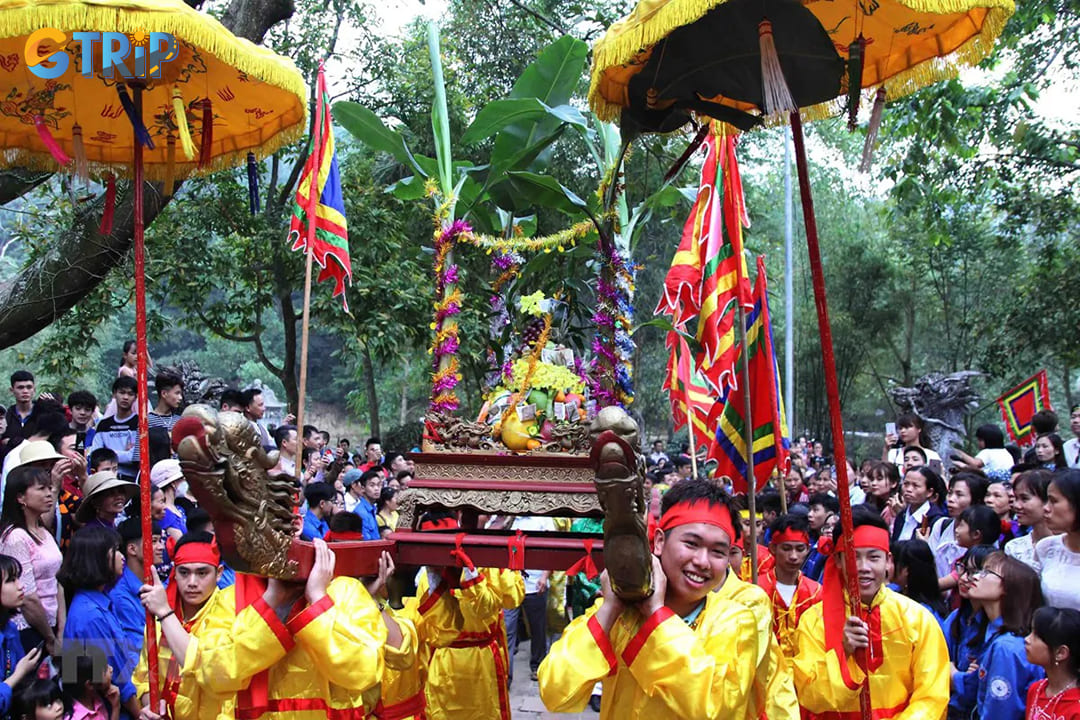
The Giong Festival at Soc Son Temple, a UNESCO-recognized heritage, honors the legendary Saint Giong with vibrant rituals each Lunar January
7. Thay Pagoda Festival - Features religious rites and folk shows
- Location: Thay Pagoda, Quoc Oai Commune (formerly Sai Son Commune, Quoc Oai District), Hanoi
- Dates: 5th - 7th days of March (Lunar calendar)
The Thay Pagoda Festival is among Hanoi’s most spiritually meaningful events, taking place each year at Thay Pagoda (Thien Phuc Tu) in Quoc Oai. Spanning three days, it honors Tu Dao Hanh, a monk of the Ly Dynasty celebrated for his wisdom, contributions to Vietnamese medicine, and the creation of water puppetry. The festival begins with incense offerings, chanting, and a solemn procession where Tu Dao Hanh’s statue is carried outside the sanctuary, allowing pilgrims to pay respects. Blessing rituals and the symbolic bathing ceremony of the statue reflect centuries-old practices, offering visitors a rare chance to experience spiritual traditions preserved since the 11th century.
Beyond its religious depth, the festival captivates visitors with cultural performances and community spirit. On Long Tri pond, traditional water puppet shows bring folk legends to life in the very art form credited to Tu Dao Hanh. Folk dances, music, and historical reenactments add vibrancy, while games like bamboo swinging and tug-of-war recreate the festive energy of village life. Together, these activities create a rich blend of spirituality and artistry, making the festival an unmissable cultural experience near Hanoi.
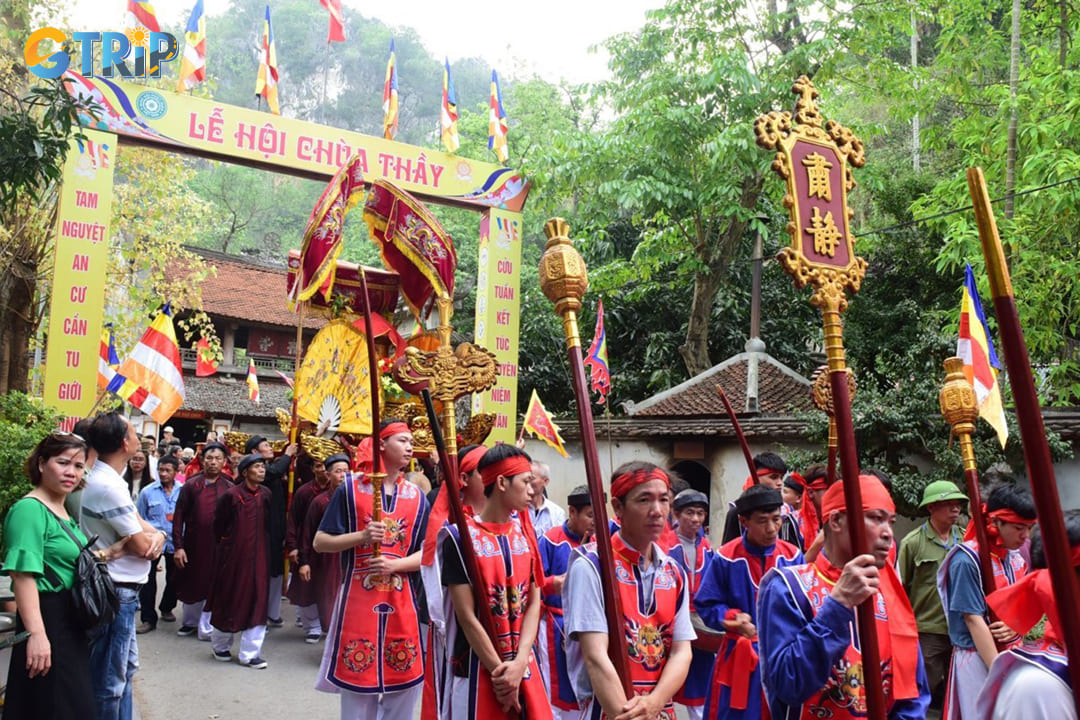
The Thay Pagoda Festival in Quoc Oai honors monk Tu Dao Hanh with rituals and folk performances, blending spirituality and cultural heritage in a serene setting
8. Vong La Festival - A culturally significant local celebration
- Location: Dai Do Temple, Dong Anh Commune, Hanoi
- Dates: 13th - 15th days of January (Lunar calendar)
The Vong La Festival, held annually at Dai Do Temple in Dong Anh Commune, is a three-day celebration that honors General Thien Cuong, a loyal figure under the 18th Hung King. Revered for teaching villagers agriculture and protecting the land from invaders, he is remembered through solemn rituals led by village elders. Incense-filled ceremonies and a grand procession carrying his spirit tablet through the commune symbolize blessings of protection, prosperity, and unity. This deeply rooted tradition not only reflects community gratitude but also preserves authentic northern Vietnamese cultural practices that remain little altered over centuries.
Beyond spiritual ceremonies, the festival offers vibrant cultural experiences, from water puppetry and Quan ho folk singing to Cheo opera and lion dances. Visitors can also enjoy traditional games such as bamboo swinging, tug-of-war, and rice-cooking contests, which emphasize both entertainment and agricultural heritage. The festival remains less commercialized, giving travelers a genuine glimpse of local life and values that combine history, spirituality, and communal spirit in one of Hanoi’s most unique celebrations.
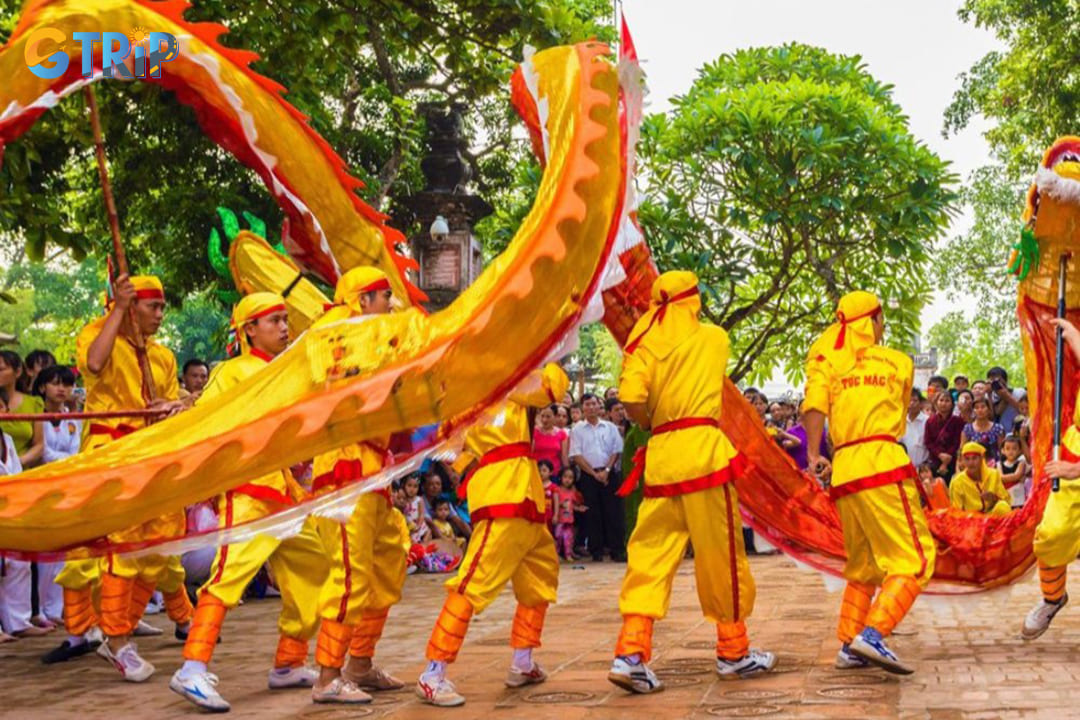
The Vong La Festival in Dong Anh honors General Thien Cuong with rituals and folk performances, preserving authentic northern Vietnamese cultural traditions
9. Bach Ma Temple Festival in Hanoi
- Location: No. 76 Hang Buom Street, Hoan Kiem Ward (formerly Hoan Kiem District), Hanoi
- Dates: The 12th–13th days of the 2nd lunar month every year
The Bach Ma Temple Festival, celebrated each spring in Hanoi’s Old Quarter, is among the most sacred traditions of the capital. Dedicated to the legendary white horse that guided King Ly Thai To in establishing the city’s boundaries in 1010, the festival is both a spiritual and cultural highlight. Visitors are welcomed into the centuries-old temple, where incense-filled ceremonies, elaborate offerings, and blessing rituals honor the temple’s deity. The site itself, with its lacquered columns, detailed wood carvings, and central white horse statue, remains a living testament to Hanoi’s founding mythology.
Beyond its rituals, the festival transforms the Old Quarter’s narrow streets into a lively stage of culture and devotion. Processions carrying sacred objects wind through the neighborhood, accompanied by traditional music, folk dances, and community feasts. For locals, it reinforces the city’s deep-rooted identity, while for visitors, it offers an authentic glimpse of Hanoi’s spiritual life and heritage. Experiencing the festival means not only observing a centuries-old celebration but also stepping into the very story of how Hanoi began.
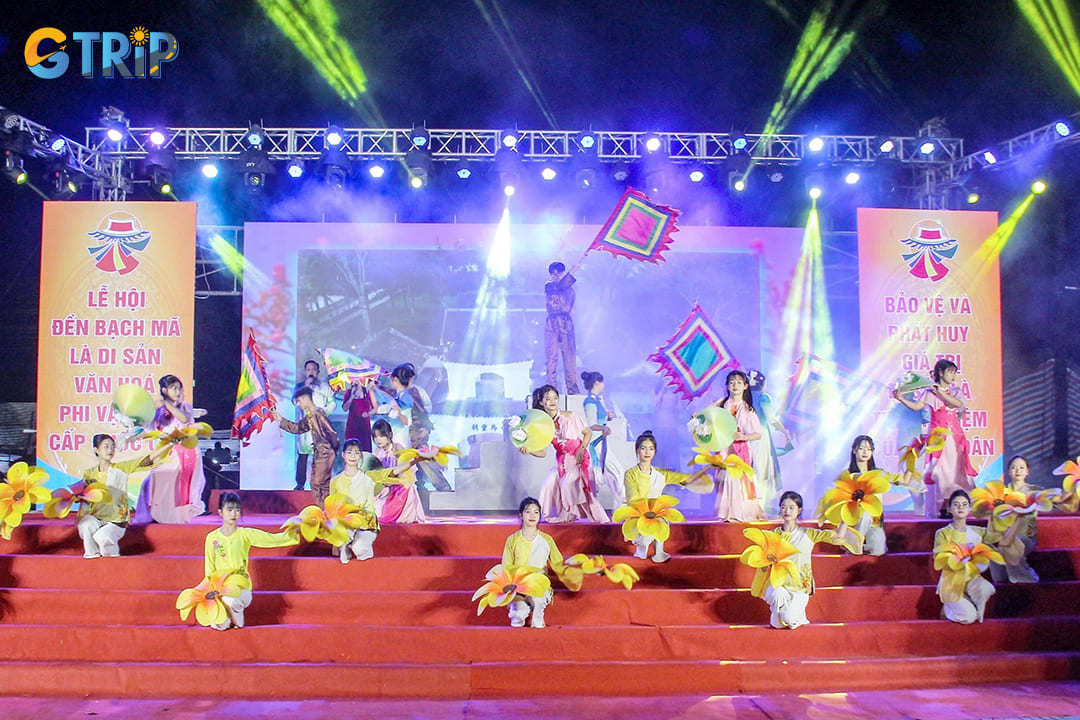
The Bach Ma Temple Festival in Hanoi’s Old Quarter honors the legendary white horse of King Ly Thai To with centuries-old rituals and cultural traditions
10. Co Loa Citadel Festival - Celebrates the ancient capital's history
- Location: An Duong Vuong Pagoda, Dong Anh Commune (formerly Dong Anh District), Hanoi
- Dates: 6th - 16th days of January (Lunar calendar)
The Co Loa Citadel Festival, held annually at An Duong Vuong Temple in Dong Anh Commune, commemorates King An Duong Vuong, the legendary founder of the Au Lac Kingdom and builder of Co Loa, Vietnam’s oldest citadel, dating back to the 3rd century BCE. The festival highlights the citadel’s historical role as one of the nation’s earliest defensive structures through solemn rituals such as incense offerings, water processions, flag-raising ceremonies, and ceremonial drumming on massive bronze drums. Performed in traditional costumes with strict attention to historical detail, these rites honor the king’s legacy while preserving traditions passed down for centuries.
Beyond its rituals, the festival transforms Co Loa into a vibrant cultural stage. Visitors can enjoy folk games like bamboo swinging and wrestling, watch historical reenactments of the magic crossbow legend, and experience traditional music including ca tru and quan ho. Food stalls serve regional delicacies, while the citadel grounds invite exploration of ancient walls and archaeological sites. The festival provides a rare chance to witness Vietnam’s early heritage come alive, blending history, culture, and community spirit in an authentic setting.
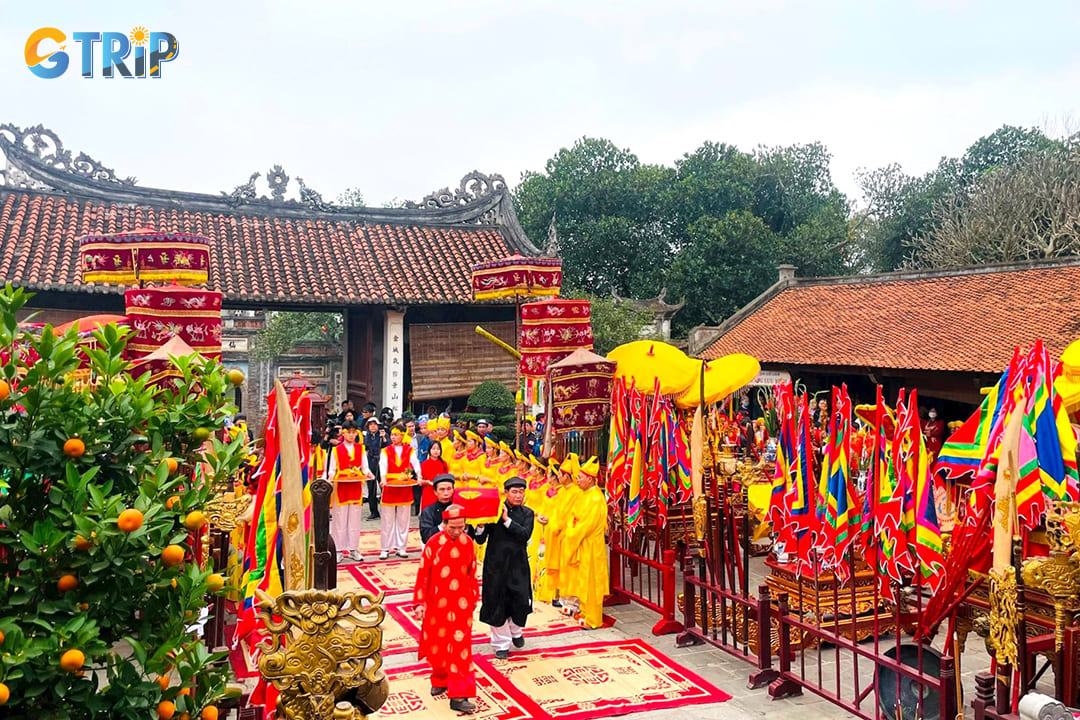
The Co Loa Citadel Festival in Dong Anh honors King An Duong Vuong and Vietnam’s ancient Au Lac Kingdom with vibrant rituals and cultural traditions
11. Le Mat Festival - Known for its unique snake procession
- Location: Le Mat Village, Viet Hung Ward (formerly Gia Lam District), Hanoi
- Date: March 13th (Lunar calendar)
The Le Mat Festival is among Hanoi’s most distinctive cultural events, held annually on the 13th day of the third lunar month (April or May in the Gregorian calendar) at Le Mat Village. For centuries, this community has been famous as Vietnam’s “snake village,” honoring their patron deity Saint Giang, the hero believed to have saved a princess from a river monster and later taught the villagers snake breeding and medicinal practices. The festival not only preserves this unique heritage but also reflects the villagers’ gratitude for prosperity and cultural identity passed down through generations.
What sets the festival apart is the blend of solemn rituals and vibrant community activities. The snake procession, where a large python is carried through the village on a decorated palanquin, remains the centerpiece, symbolizing courage, protection, and ancestral reverence. Alongside it, visitors can witness traditional folk games, northern-style musical performances, and snake-handling demonstrations, while adventurous food lovers may sample snake-based delicacies prepared with age-old techniques. Together, these experiences create a rare cultural spectacle that intertwines legend, spirituality, and local life in a way few festivals can match.
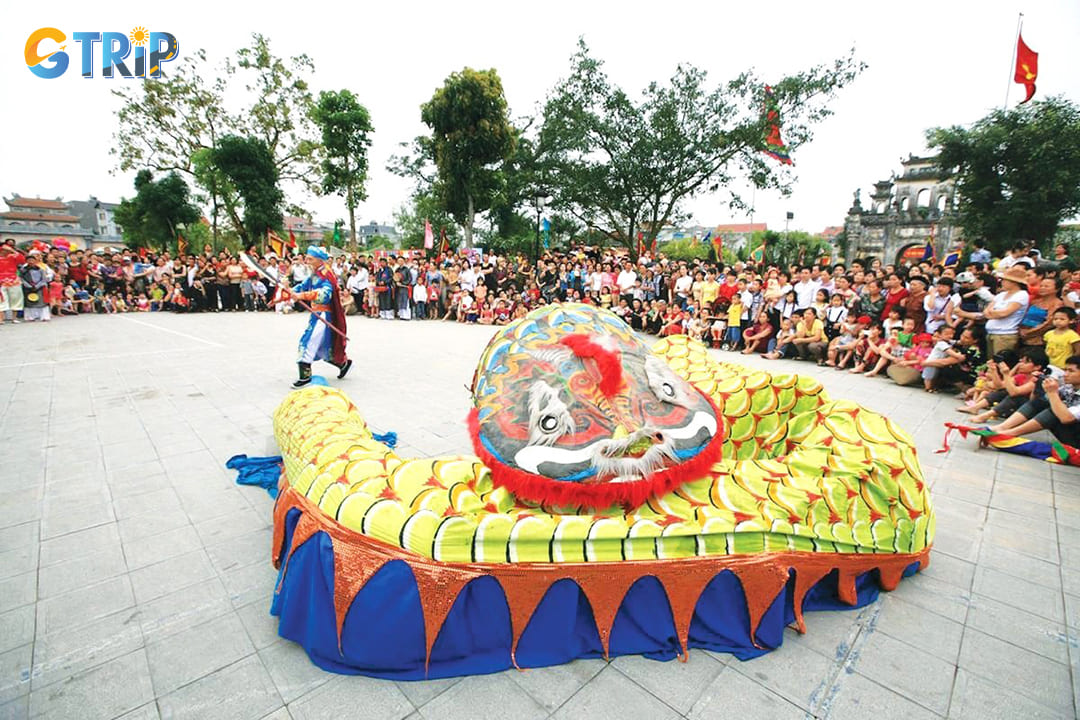
The Le Mat Festival in Gia Lam celebrates the village’s centuries-old snake-raising heritage with vibrant rituals each Lunar March 13
12. Tan Vien Son Thanh Festival - Dedicated to the Mountain God
- Location: Ba Vi Commune (formerly Minh Quang Commune, Ba Vi District), Hanoi
- Dates: 13th - 14th of January (Lunar calendar)
The Tan Vien Son Thanh Festival, held on the 13th and 14th days of the first lunar month in Minh Quang Commune, Ba Vi, is dedicated to Son Tinh, the revered Mountain God and one of Vietnam’s Four Immortals. Rooted in the ancient legend of Son Tinh’s victory over the Water God, the festival highlights his role as protector against floods and teacher of vital farming techniques. More than just a myth, it reflects the Vietnamese people’s deep respect for natural forces and their reliance on agriculture, making it one of the most spiritually significant celebrations in northern Vietnam.
Over two days, visitors can witness solemn incense offerings, colorful processions with ornate palanquins, and symbolic rituals that reenact Son Tinh’s triumph. Folk performances such as ca tru singing, water puppetry, and traditional dances bring cultural vibrancy to the sacred setting, while prayers for good harvests link the event closely to agrarian life. Against the mystical backdrop of Ba Vi Mountain, the festival immerses pilgrims and travelers alike in a unique blend of legend, spirituality, and authentic rural traditions.
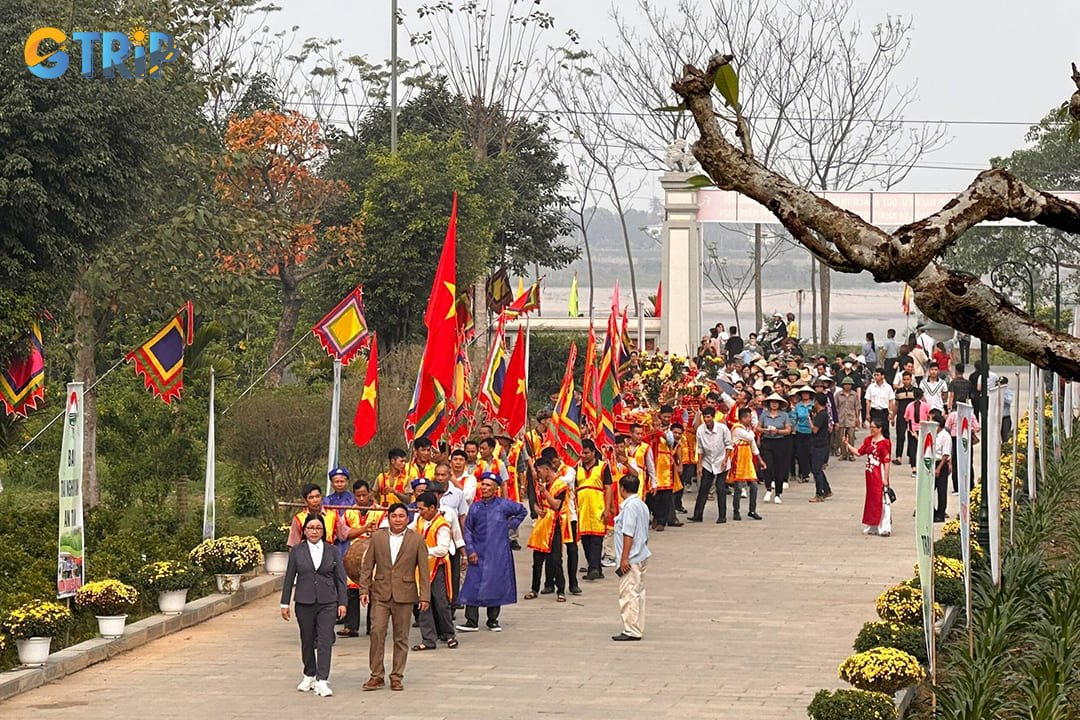
The Tan Vien Son Thanh Festival in Ba Vi honors the Mountain God Son Tinh with worship and cultural celebrations each Lunar January
Read more:
Exploring the vibrant festivals in Hanoi immerses you in a captivating blend of tradition, culture, and community spirit that defines this remarkable city. Each festival offers a unique window into Hanoi’s soul. Your journey through these festivities will enrich your understanding of Vietnam’s rich heritage and provide unforgettable memories filled with joy and connection. As you ponder your next travel plans or perhaps revisit favorite cultural experiences in other destinations, consider how these celebrations shape our shared humanity. You can book Hanoi tours of GTrip - Vietnam Travel Agency to experience those festivals.

